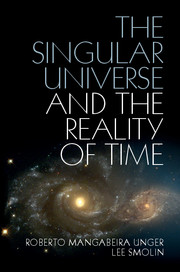Book contents
- Frontmatter
- Contents
- The nature and scope of this work
- Part I Roberto Mangabeira Unger
- 1 The science of the one universe in time
- 2 The context and consequences of the argument
- 3 The singular existence of the universe
- 4 The inclusive reality of time
- 5 The mutability of the laws of nature
- 6 The selective realism of mathematics
- Part II Lee Smolin
- Acknowledgments
- References
- A note concerning disagreements between our views
- Index
- References
4 - The inclusive reality of time
Published online by Cambridge University Press: 05 December 2014
- Frontmatter
- Contents
- The nature and scope of this work
- Part I Roberto Mangabeira Unger
- 1 The science of the one universe in time
- 2 The context and consequences of the argument
- 3 The singular existence of the universe
- 4 The inclusive reality of time
- 5 The mutability of the laws of nature
- 6 The selective realism of mathematics
- Part II Lee Smolin
- Acknowledgments
- References
- A note concerning disagreements between our views
- Index
- References
Summary
The problem presented: how much of nature exists in time?
Time is real, and everything that exists, or has ever existed, or will ever exist, takes place in time. From this thesis there results the idea that the laws of nature must in principle be susceptible to change. Like everything else in this one real universe, they have a history.
The inclusive reality of time is not a tautology or a truism. It is a revolutionary proposition. Rightly and therefore radically understood, it is incompatible with a major element in the dominant tradition of modern science, the tradition that goes from Galileo and Newton to the particle physics of today. In particular, it contradicts the “block-universe” picture of the universe as well as the application of the Newtonian paradigm – the explanatory practice that explores law-governed phenomena within a configuration space bounded by initial conditions – to the universe as a whole. It puts pressure on our conventional notions of causality. It compels us to reconsider our beliefs about the possible and the new in nature. It suggests that the laws of nature are mutable and that the relation between laws of nature and states of affairs varies. It gives us reason fundamentally to invert the relation between historical and structural explanation in natural science, so that we may come to see the former as more fundamental than the latter rather than as derivative from it.
- Type
- Chapter
- Information
- The Singular Universe and the Reality of TimeA Proposal in Natural Philosophy, pp. 162 - 258Publisher: Cambridge University PressPrint publication year: 2014

